 The Naked Time
The Naked Time
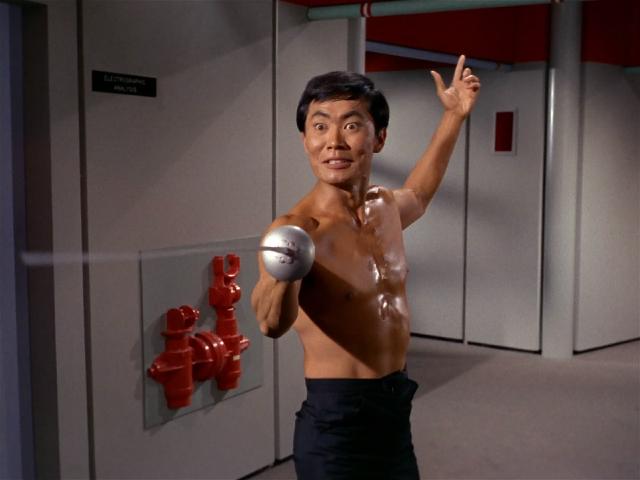
Review
Four episodes in, and Star Trek starts hitting its stride. This episode is finally not a monster-of-the-week story with a tragic villain who must be defeated by force leading to a melancholy ending. It’s an “anomaly-of-the-week” story with no villain except the crew’s own repressed desires, wherein the day is saved by scientific expertise and the body count is the lowest yet (just one death of a not-very-sympathetic character) and the most apparent lasting damage caused is embarrassment. But more than that: this episode does some excellent character work, especially with Spock. This is the episode where he becomes the franchise’s most beloved character.
The show accomplishes all this on two levels. One is via the events of the plot: dealing with the Psi 2000 virus, regaining control of the ship, and powering up the engines in time to escape the collapsing planet. The crisis gives several of the main cast members a chance to show off their personality and skills: Kirk and Spock both prove to be competent leaders, plus we see Spock’s scientific and mathematical prowess. McCoy shows off his gruffness, stubbornness, and dedication, as well as his medical expertise in figuring out and curing the apparently-impossible virus, while his friendly bickering with Spock in sickbay shows off the nature of their relationship. Scotty displays his resourcefulness and pragmatism as well as his pride in and protectiveness over his engines. Uhura is shown to be reliable and multi-skilled as well as tough and quick-witted.

These are all effective introductions to the respective characters and the roles they play on the show, but the nature of the Psi 2000 virus lets things go even further. Because its effect is an alcohol-like loss of inhibition, this is basically just a sci-fi twist on getting the characters drunk so they can reveal what’s going on beneath the surface.
A significant amount of attention is paid to Tormolen and Riley’s behavior under the influence, which feels a bit wasted since Tormolen dies and Riley only recurs in one further episode. But this conceit also results in maybe the deepest insights the series ever gives us into Sulu and Chapel. Sulu’s unhinged, shirtless swashbuckling is delightful and iconic, showcasing the dashing hero under the unassuming professional. Notably, that scene also features the first appearance of the Vulcan nerve pinch, but before that happens there comes something even more striking but easy to miss: Uhura quipping, “Sorry, neither,” in response to Sulu calling her a “fair maiden.” It’s a great line delivered well which accomplishes some very efficient (and quite racy for the time) characterization for Uhura, establishing her as the opposite of a damsel in distress and providing inspiration to this day.
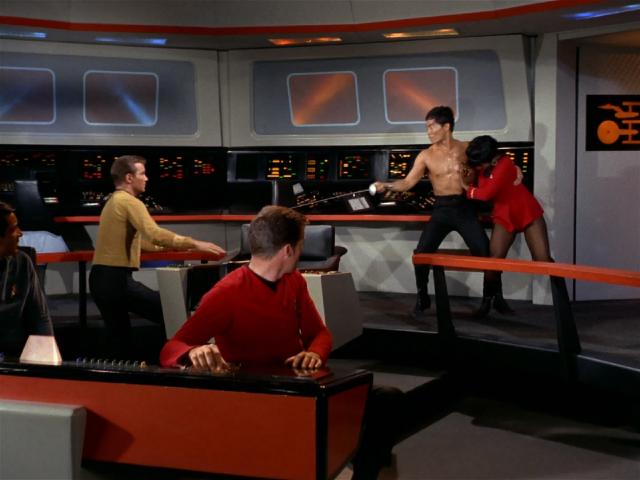
This episode is also Chapel’s first appearance and one of her meatiest, resulting in her confession of love for Spock being forever seen as central to her character. But it’s also a turning point in the story. By the time it happens, the audience is clearly expected to have their guard lowered from laughing at the antics of Sulu and Riley. The show can now sneak in some serious and affecting character work.
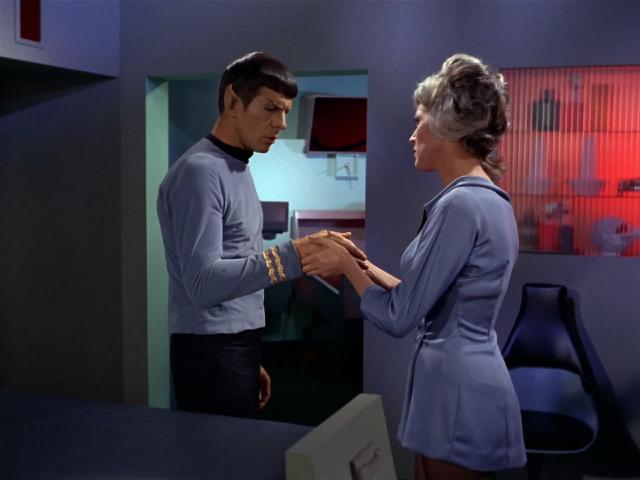
First, Chapel demonstrates how to love Spock. Everyone knows he’s a capable officer, but Chapel sees more. She understands and accepts him in a way nobody else does. She trusts him despite his alienness and knows he would never hurt her despite his culture’s reputation. She knows he’s not just the stoic, inhuman Vulcan he presents himself as, but that he’s human too. And though he rejects his own human half and seeks to repress his feelings, she sees the pain this causes him and she assures him that she loves both sides of him just the way he is.
But since she infects him in the process, his ironclad emotional control is shaken. He retreats to an empty briefing room, barely holding himself together along the way. Once he gets there, he comes completely undone, proving that Chapel was right but not letting anyone see it… except us.

Before this point, we’d seen Spock as completely unflappable. In just the last episode, he was the only one not blinded by misguided compassion, claiming that he could see clearly because he knew only logic and did not feel. This scene reveals that his character is actually richer and more complex than that, and in fact he is constantly at war with himself to live up to Vulcan ideals despite his split ancestry.
It’s a powerful performance, its shocking nature highlighted by the lack of backing music. We are alone with Spock and his struggle. We get to see the Spock that Chapel knows is there under his strictly-controlled exterior. We get to see his vulnerability.
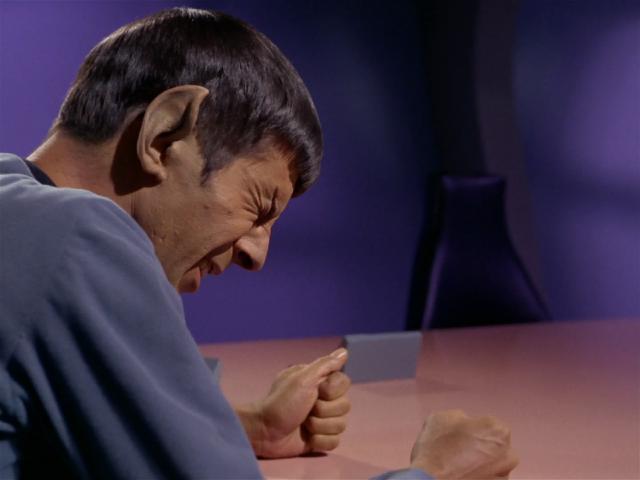
Once Kirk finds him, Spock has regained his composure but not his control, and he confesses to several things he’s likely never admitted before. He laments that he could never tell his human mother that he loved her, that he was ashamed of his human blood, and that to this day he feels shame for his emotions of friendship toward Kirk. This does show us that Spock trusts Kirk, but the real punch comes when an infected Kirk breaks down and bemoans the loneliness of command. Seeing that Kirk has lost his own control and is no longer capable of managing the crisis is what jolts Spock back into reality and leads to him stepping up and saving the day.
The episode’s ending unfortunately drops the ball somewhat, failing to provide closure on the character threads and instead focusing on a time travel non-sequitur that adds nothing. I wish that had been removed in favor of something like Kirk and Spock exchanging some veiled comments about understanding each other’s struggles. The most we do get is Kirk lamenting that he can’t pursue Rand–which just feels whiny at this point, since Kirk chose to be a captain and the episode’s previous scenes have given us much more reason to care about Spock, who didn’t choose to be a child of two worlds.

The weakness of the ending harms the episode a bit, but it’s still a story with a competent, easy-to-follow dramatic plot with tension, humor, and emotional depth that also serves as a great intro to the entire ensemble. It’s the first episode of Star Trek that I can confidently recommend watching and it’s a fine place to get started. Just be warned that there’s a good chance it will make you fall in love with Spock.
Assorted Observations
The plot of this episode only has two problem spots, though unfortunately they are fairly important spots: the beginning and the end. I already mentioned the ending’s pointless and distracting time travel (allegedly an editing artifact from when this episode was planned to lead into one about time travel) but the opening has some issues too. And I’m not talking about the environment suits made out of shower curtains; those are absolutely delightful.
No, my issue is just how hard the opening scene has to work to get Tormolen infected with the Psi 2000 virus. Having the lab be full of ice and corpses is a very dramatic and attention-grabbing image to start the episode with, and the environment suits sell the idea that the planet is a frozen death trap, but this also means that Tormolen has to engage in several improbable behaviors to become exposed. The moment Spock leaves the room, Tormolen gets a sudden irresistible itch on his nose that compels him to remove his glove and reach up into his helmet for a scratch. This is a forgivable contrivance, but then instead of immediately replacing his glove he leaves it off, decides for no clear reason to scan under a desk, crouches down to do so, and braces himself by putting his unprotected hand directly onto the frost-covered desk and leaving it there for several seconds… during which time a droplet of infected blood jumps onto his exposed hand, a capability which is never revisited or explained. Tormolen sniffs his hand but doesn’t otherwise react except to finally replace his glove and then Spock comes back just in time to miss the whole thing. When he caps the moment off by saying, “Be certain we expose ourselves to nothing,” on-the-nose and just barely too late, I can’t help but laugh at how needlessly ham-fisted this sequence is.
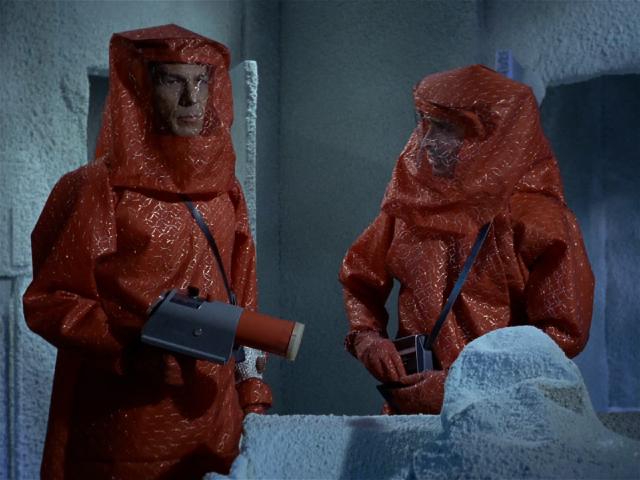
Once he is infected, Tormolen becomes preoccupied with the hubris of space travel. This was one of the themes unfortunately implied by “Where No Man Has Gone Before”, but here it’s presented as a sign that he’s psychologically unwell. That is certainly progress, but it still feels out of place to me and an artifact of the writers failing to really put themselves in the show’s setting. In context, this concern would be like someone in today’s Air Force worrying about the hubris of humanity traveling the skies after growing up in a world in which flight is routine and a cornerstone of the global economy.

This episode features a few bizarre captain’s log entries. The opening of Act Two has Kirk stating that “unknown to us” a disease has been brought on board, while the opening of Act Three has Kirk apparently making a log entry while rushing to Engineering to save the ship that is now minutes away from destruction. This seems strange to modern viewers, but it’s important to remember that Star Trek aired on scheduled broadcast television before home video existed. The captain’s log isn’t to be taken as literal and in-universe but as a device by which an omniscient narrator can recap the important plot events for viewers just tuning in after each commercial break. It’s not usually quite this blatant, however.